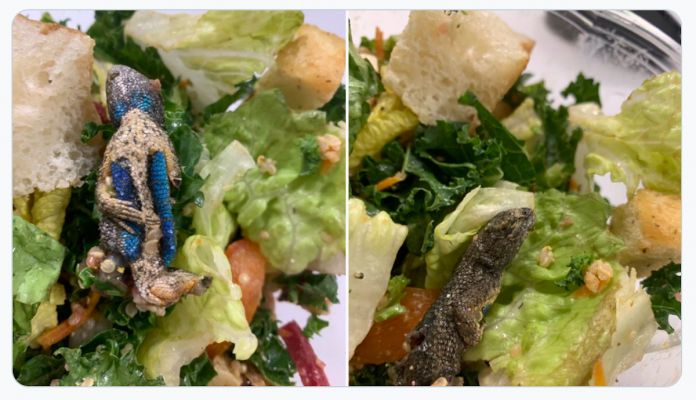Local media in the Seattle area reported that a woman found a dead lizard in her restaurant salad.
Maniza Qureshi reported the incident to the Seattle & King County Public Health after the shocking experience of a lunch salad from an evergreens restaurant.
“No other complaints about foreign objects in the salad have been received at this location. Based on the items placed in the lettuce, it is possible that the lizard came in one of the sealed packs of greens, ”read a report from the Public Health Inspector.
Seattle-based food safety attorney Bill Marler, a food safety expert, told KIRP-TV Channel 7 that finding creatures in food isn’t as rare as you might think.
“Snakes, mice, spiders, sometimes living things, sometimes non-living things,” said Marler. “The good thing is, while these things are grotesque, most of the time they don’t cause human disease.”
Qureshi told the news agency that part of a leg and tail of the lizard was missing, which made them wonder if it had ingested parts of the animal or if other customers’ food was possibly contaminated.
The shocked diner also spoke to WKQX radio Channel 101.1, which posted a photo of the salad with the lizard on its Twitter feed.
Other media in the region reported that the restaurant management was just as shocked as their customer.
Evergreens CEO Ian Courtnage told the broadcaster that the company pays suppliers a premium to ensure that the lettuce and greens they receive are ready to go.
“We are working with a national supplier who triple washes, cuts and packages the greens so that they are ready for us to eat – especially to avoid problems,” said Courtnage, adding that they contacted the supplier immediately to find out what went wrong
Qureshi told the media that she took the situation public because she believed the restaurant staff should have noticed the animal while they were preparing their salad.
“As soon as the service container was filled, the employees had to go through the greens,” says the health report.
The report also states that the supplier for lettuce is from California, but not where the kale is grown.
(To sign up for a free subscription to Food Safety News, click here.)

